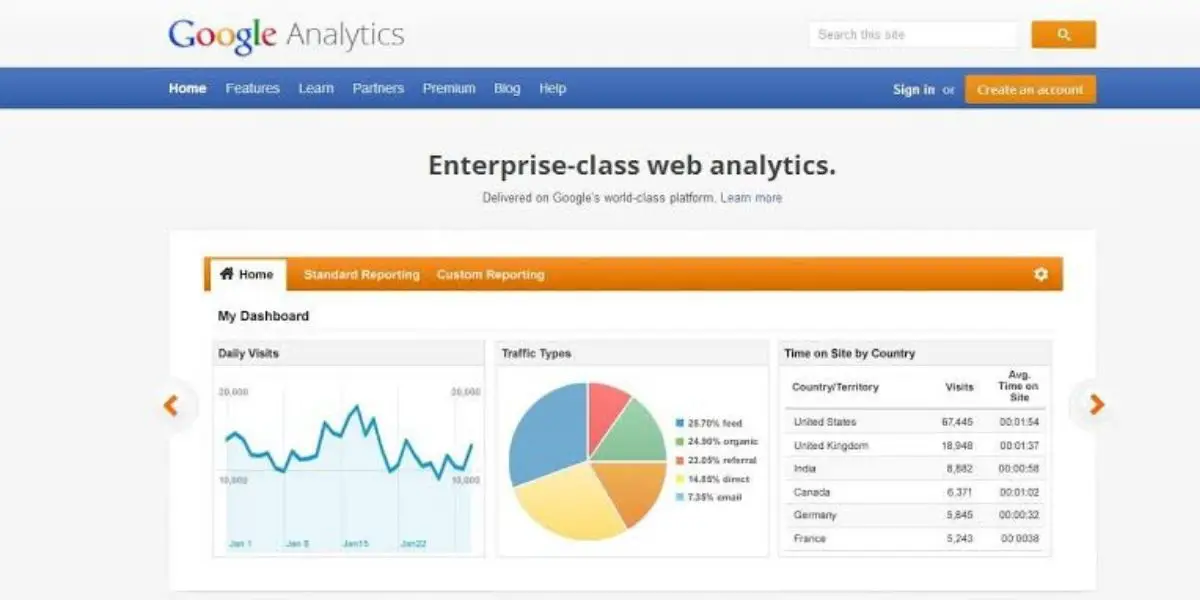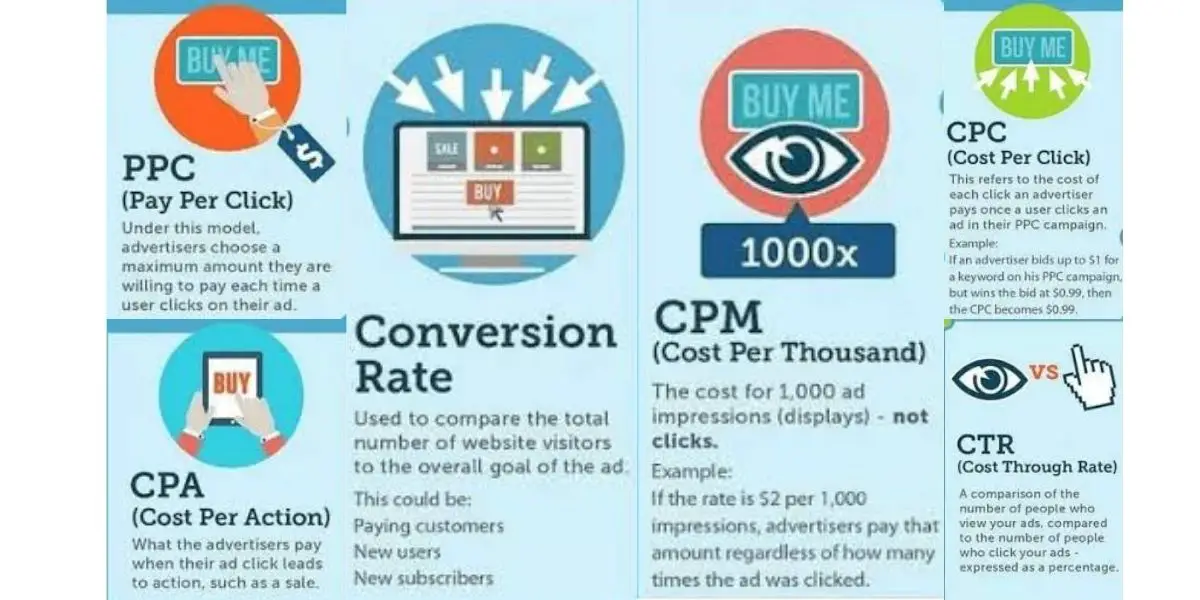This one is for you:
Whether you’re a rookie blogger looking to make money,
Or a multimillion-dollar company looking to better monetize its audience in order to hit the 8- or 9-figure mark.
Read on to discover how much traffic you need to start making serious money from your website.
What is the Importance of Website Traffic?
Let’s start with the basics before moving on to the major question.
A general guideline is that more traffic equals greater revenue for a company.

It would be fantastic if every visitor became a paying customer. But no one is so fortunate.
The truth is that most websites’ conversion rates from website traffic are merely 1-3 percent.
So, out of 100 visitors that see your product page, just 1-3 will give you their hard-earned money.
What are the remaining 97-99 percent of the population up to?
I’m clicking away without making a purchase.
Your website serves as a one-stop-shop for all things related to your business and the value you provide to them.
People who don’t visit your website are unlikely to be aware of your brand, let alone what you have to offer.
And if they don’t know what you have to offer, they won’t be able to buy it.
How to Monitor Traffic
Since we’ve shown that traffic is inextricably linked to website revenue, you’ll need to know how much traffic your site generates.
To do so, use Google Analytics, a well-known industry tool that is also free.
You now have accurate data measuring:
By linking your site with Google Analytics, you now have accurate data measuring:
- The number of people that have visited your website
- Pages they looked at
- Rate of re-entry
- Duration of the session

Use this tool to keep track of your progress and ensure that you’re getting consistent good outcomes.
If you notice that your traffic is declining, you can take action and investigate the cause to limit the amount of time you see diminishing statistics.
Long-term objectives should always be to increase website visitors since money will inevitably follow.
Now comes the moment you’ve been waiting for:
How much traffic does a website need to make money?
How to Keep Track of Your Website’s Profits
The next parts explain how to monetize your website.
You’ll need to know your company’s cost per click (CPC) and click-through rate (CTR) to input into the equations before we start.
The cost per click is the price you pay for paid advertising.
This is the amount that your ad platform pays you each time someone clicks on an ad on your website.
A click-through rate (CTR) is a measurement of how many times a user clicks on a link.
The percentage of visitors who viewed and clicked your ad divided by those who viewed it but did not click is known as the click-through rate.
Once you have these, you can plug them into the calculations below to get an estimate of how much traffic you’ll need to create.
To make money from ads, you’ll need a lot of traffic.
We opted to put the first threshold at $3,000 per month, or $100 every day.
This is a typical compensation for someone who wants to create their web business full-time instead of working full-time.
The quantity of traffic you’ll need to produce $100 every day depends on a variety of things.
We’re just assuming in our first example that you’re making money through an ad platform like Adsense.
However, having other items or services, as well as the price you charge for them, is a big role in determining how much traffic you’ll need to earn money.
Aside from writing for ad revenue, you’re probably also selling ebooks, courses, or one-on-one coaching.
These are also characteristics that influence how much traffic you’ll need to make money.

The strategy below assumes you need to make $3,000 per month and exclusively use advertisements to monetize your site.
The First Step
The first step is to calculate how many clicks it will take to reach our $100 per day ($3,000 per month) goal.
To determine this, apply the following formula: money desired / CPC. Let’s say my cost per click is $2.
The total number of clicks I need is $100/$2, which is 50.
The Second Step:
The next step is to figure out how much total traffic you’ll require for $100 every day.
You’ll need to use the following equation to figure it out: Number of clicks / CTR. The number of clicks is derived from the first step.
Let’s say my CTR is 2%.
To produce $100 each day, I’d need 50 / 0.02, which equals 2,500 visitors.
To make $100 per day, I need 2500 visits per day to my website.
The Third Step
The next step is to calculate the overall traffic you’ll need to reach our target each month.
You’ll need to use the following equation to figure it out:
The number of visitors each day multiplied by the number of days in a month equals the total number of visitors.
We use 30 days as the number of days in a month for consistency’s sake.
The calculation in step two yields the number of visitors each day.
For this example, the total monthly traffic required is 2,500*30, resulting in 75,000 monthly visitors to your site.
Remember that these are approximations, and the amount of traffic required for your business is determined by your own CPC and CTR numbers.
Pro Tips For Getting More Traffic
Organic and sponsored techniques are the two most common ways to increase website traffic.

Search engine optimization can help you generate organic traffic (SEO).
This is accomplished by leveraging keywords to rank your website first in Google for specific keyword searches.
Paid advertising can also be used to drive traffic to your website.
This is paid advertising on Google, Facebook, and Instagram to reach your target demographic.
We also provide advertising services for a fee.
Paid advertisements are by far the most efficient strategy to generate new leads and sales.
When it comes to increasing your website traffic organically, keep in mind that you can’t expect to see results right away.
You’re embarking on a long-term quest that will require continual attention and improvement over the coming weeks, months, and years.
To be honest, I’ve found that seeing benefits from your efforts can take up to 6 months.
But if you have the patience, you’ll start reaping what you’ve sown in six months.
Here is some expert advice on how to generate long-term website traffic and turn it into big profits.
- Recognize your target audience
Knowing who your target audience is and what attracts them is critical to increasing website traffic.
You will never generate website traffic if you don’t know who to market to and where to locate them.
Determine where your audience spends most of their time and promote your material there via free content and advertisements.
Before you produce your content, you need to understand how people will locate and share it.
Knowing this allows you to tailor your content to the platform where they spend the most time.
Another suggestion is to develop the practice of tracking your audience’s evolution over time.
Is your content regularly meeting people where they are?
- Make Use of Existing Content
Don’t lose sight of what you’ve already accomplished!

The majority of what you’ve created is still relevant to your audience.
It’s fine to promote previously published information.
Link to previous blog articles in new blog articles, share on all social media platforms and repeat because social media is a place where posting different information that leads back to the same blog article is acceptable.
This will send the user to your site rather than your competitor’s for information.
- Concentrate on the leads you already have.
It’s easy to get carried away with the thrill of creating new traffic and leads.
Retention, on the other hand, is still an important factor in producing page views and cash.
It’s usually a good idea to spend some time working out what your current clients and prospects require.
Asking our consumers three questions is one of the most effective ways we maintain tabs on them.
Questionnaires for customers
This not only demonstrates your genuine concern but also brings new content and sales chances to the forefront.
(Ask prospects three different questions to measure their level of interest.)
When a consumer says, “I’ve been looking for something similar to this, do you have anything?”
You can compose a blog article about this issue and then send it to that consumer, who will feel as if they are the focus of an entire blog post.
This builds a special link between you and your customers, which leads to sales.
According to studies, while selling to consumers, roughly 65 percent of your existing clients will buy your products vs an estimated 10% of new clients.

You should devote at least half of your attention to this group because they can help you boost your conversion rates quickly.
- Make Your Own Resource Page
Adding a resource page to your website will almost certainly improve traffic and foster relationships with your peers.
A resource page is a page on your website dedicated to recognizing websites, goods, and people that you believe your visitors would find interesting.
You form positive relationships with others and generate goodwill in your specialty by linking these resources to your site and notifying the creators.
Reaching out to these individuals and expressing your admiration for their work is the first step toward establishing a mutually beneficial connection.
Because they are highlighted on your website, they will frequently share them.
You now have a segment of their followers who will visit your site when they share it.
That’s how you build momentum for your company by spreading value.
- Create Collaborative Posts
This is yet another option to network with people in your business.
You’re probably aware of the value of blogging in the corporate world.
If you don’t already, creating new content for your target audience should be a big component of your marketing plan.
A roundup post, on the other hand, might not be in your content plan.
Ask some people in your industry if they’d be interested in writing a small section for a larger blog post; the more clout these people have, the better.

They’ll get a mention in their section to let your followers know where they can find them.
If they agree, they’ll probably share the post because they contributed to it.
Your website is now visible to their followers after they share it.
Every time you make a roundup post, your relationships get stronger, your traffic increases, and your business expands.
- Content Repurposing
Many website owners overlook the fact that different visitors have varying preferences for how they consume content.
It’s a tremendous mistake to only produce content for one channel, as it leaves huge gaps in reaching entire client categories.
The good news is that you can repurpose material that you’ve already published on one media for use on another.
You can reuse a blog post you wrote into a podcast episode, for example.
You’re now accessing a market of people who prefer to obtain their content from blogs and those who like to get it from podcasts.
One of the most effective techniques to increase website traffic is to expand your presence across several channels.
- Convert Emails Into New Visitors
Getting people to sign up for an email list is usually the first step in converting them to a customer for most businesses.
You can also utilize your emails to drive traffic to your website by sending out a newsletter with new material and include a link to your site in your email signature.
The link could be to a landing page for a product you’re promoting, a recent blog post you wrote, or just your website’s homepage.

Your signature can also vary as the products you advertise and the blogs you publish the change.
Conclusion
You now have a better understanding of how much traffic a website requires to generate revenue.
Keep in mind that this number will be specific to your company and its objectives.
In any case, good luck with your long-term goals and increasing your website traffic!
 Reviewed by helpquoratech
on
September 18, 2021
Rating:
Reviewed by helpquoratech
on
September 18, 2021
Rating:



No comments: